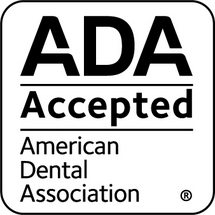Q: What should I expect at my first appointment?
A: The first appointment is used to get to know a patient and to find out their main dental concerns. We gather information about the patient’s past and present medical history. We take x-rays, and a thorough evaluation is done of the entire mouth to determine a patient’s dental history and current condition. Patients are seen by a dental hygienist to evaluate the health of the gum tissue. The dentist then sees all new patients to examine, diagnose, and educate patients about their dental condition and treatment options if necessary.
Q: Why can’t I have my teeth cleaned at the first appointment?
A: A thorough evaluation of the gum tissue known as a periodontal chart is performed at a patient’s first visit then repeated every 12-18 months thereafter. When the gum tissue is determined to be within normal limits and the patient has minimal dental needs, a healthy cleaning called a prophylaxis can be done at the first visit if time allows. However, if the gum tissue is not within normal limits or the patient has several dental needs then a cleaning is not offered at the first visit. Patients who do not have healthy gum tissue often need to be seen for more in-depth therapy called perio therapy (scaling and root planing). This type of therapy requires a longer amount of time than the first visit allows.
Q: Why do I have bad breath and what can I do about it?
A: Bad breath or malodor can be caused by many things such as: lack of good oral hygiene, gum disease, chronic sinusitis, or even stomach acid. Brushing two times per day for two minutes each time and flossing at least once per day is recommended by the American Dental Association. Practicing these habits will help fight bad breath. Gum disease, also known as periodontal disease, can contribute to bad breath. Periodontal therapy and maintenance appointments are important for controlling this problem. Another contributing factor of bad breath is chronic sinus drainage. Patients who have problems with their sinuses should consult a physician and be treated to help reduce the amount of sinus drainage which will help reduce malodor. Lastly, patients who suffer from gastroesophageal reflux disease (GERD) can also experience bad breath. This condition also requires a consultation with a physician and treatment to help reduce stomach acid.
Q: What is the benefit of professional whitening treatments and how long do they last?
A: There are several whitening products that are available over the counter. Although they do have the ability to change the color of teeth, they can be expensive, hard to use, time consuming, and can cause some tooth sensitivity. Professional whitening systems usually include an easy to use custom tray system. Patients come in to have impressions taken of their teeth. The impressions are then used to make clear custom trays that hold a whitening gel and are worn by the patient while they sleep. They can also be worn while awake for 30 minutes twice a day. The initial whitening treatment takes the longest for most people and takes approximately 10 to 14 days. The amount of time depends on the amount of stain and discoloration on a person’s teeth or their desired whiteness. Once the patient determines that their teeth are the shade they want them to be, they stop wearing the trays and only wear the trays again when they determine a touch-up is needed. As long as the initial whitening treatment is completed and touch-ups are performed every once in awhile, the teeth rarely ever go back to the shade they were prior to whitening.
Q: Why are my teeth yellow?
A: Teeth turn yellow and discolor for a few different reasons. Plaque and tartar build up can contribute to the discoloration of teeth. It is important to have good oral hygiene habits and remove plaque daily so that it does not take on the color of food, drinks, or medication that is consumed by a person. Another reason for yellowing teeth is age. Teeth tend to loose their shine and start to look a little dull as we get older. Consult a dentist to see if there are any cosmetic procedures that can be performed to help hide tooth discoloration.
 Q: Why are my teeth sensitive?
Q: Why are my teeth sensitive?
A: There are many reasons that a tooth may become sensitive but is most commonly caused by root exposure. People who tend to be overzealous with their toothbrush can cause root exposure by brushing away some of the gum tissue. This is called recession. Root exposure/recession can also be caused by malocclusion or an improper bite. Having an improper bite causes some teeth to take more of the pressure than others and is often seen in patients who grind or clench their teeth. Some people also experience tooth sensitivity caused by abrasive toothpastes. Patients should tell their dentist if their teeth are sensitive because tooth decay can also cause sensitivity.
Q: How does my diet affect my teeth?
A: Diet can affect teeth when too much sugar and/or acid is consumed. Sugary foods such as sweetened drinks, candy, and carbohydrates often stick to the surfaces of the teeth and allow bacteria to attack the teeth and cause decay. Acidic foods like soda, and citric fruits or drinks can also cause the enamel of the teeth to become weak and prone to decay. People that frequently consume foods that contain both sugar and acid have a higher incidence of decay.
Q: How often should I visit the dentist?
A: The American Dental Association recommends that adults with healthy teeth and gums be seen every 6 months by their dentist. Bi-annual visits are preventive appointments that usually include an oral cancer screening, a periodontal screening, a prophylaxis (healthy cleaning) and thorough examination of the entire mouth by the dentist. This type of appointment allows the dentist to detect problems early and provide conservative treatment. Patients with periodontal disease (gum disease) are seen every 3-4 months to prevent the disease from getting worse.
Q: Why do my gums bleed when I brush and floss?
A: Bleeding gums are usually an indication of gum disease or periodontal disease. The mildest form of gum disease is known as Gingivitis and involves bleeding and inflammation of the gum tissue. More severe forms of the disease involve bleeding, inflammation, bone loss around a tooth or several teeth, and mobility. The cause of periodontal disease is bacteria that lives below the gum line and produces toxins that damage the gum tissue. It is important to tell your dentist if you have bleeding when brushing or flossing, notice a foul taste or smell in your mouth or have any teeth that are loose or hurt.
Q: What is the difference between plaque and tartar?
A: Plaque is the soft, sticky substance that forms on teeth but can be easily brushed off with good brushing and flossing techniques. It is important to remove plaque daily so that it doesn’t cause damage to the teeth and gums. If plaque is not removed it begins to turn into a harder substance known as tartar. Tartar attracts plaque and makes it hard for patients to keep their mouth clean. Tartar needs to be removed by a dental professional with a special instrument. People who build a lot of tartar on their teeth should be seen more often for professional cleanings.
Q: Why is it important to tell my Dentist about past and present overall health conditions?
A: Past and present medical conditions can affect dental treatment. Certain diseases/conditions can affect healing and make some dental procedures difficult. It is important for your dentist to know about your overall health so that he/she can provide a customized dental treatment plan that takes your health into consideration. It is also important to provide your dentist with a detailed list of prescribed and over the counter medications that you take. There can be dental contraindications with some medications.
Q: Why do I need fluoride?
A: Fluoride is used to strengthen teeth. It is added to drinking water in most communities and ingested systemically. It is recommended that children in rural areas with water wells take fluoride supplements until adult teeth have formed and erupted. People who have not had fluoride in their water often have a higher incidence of decay. Topical fluoride is also available and found in toothpaste and some mouthwashes. In-office fluoride treatments are recommended for children whose permanent teeth are still developing and erupting. These treatments have a higher amount of fluoride than over the counter products and are a quick, easy, and effective method for preventing decay.
Fluoride is also used to help reduce sensitivity in teeth that is caused by root exposure. Adults can use over the counter products with fluoride in them or be prescribed fluoridated toothpaste by their dentist. In-office topical fluoride treatments are also helpful in reducing tooth sensitivity.
 Q: What is the best toothpaste or mouthwash?
Q: What is the best toothpaste or mouthwash?
A: There are so many dental products available for purchase at local drug and grocery stores but is often hard for consumers to know what is best for them. Everyone has different oral hygiene needs so it is good that there are several products to choose from. For people who suffer with sensitive teeth there are many sensitivity formulas available that help desensitize teeth. These same people should be careful with products that claim to whiten because they are very abrasive. There are even toothpastes available for people with worn enamel, people who build tartar, and of course people who do want whiter teeth. There really is no “perfect” toothpaste, but some of the best ones include fluoride and the ADA (American Dental Association) seal of approval. Those formulas have undergone a series of tests and actually do what they claim to do. The best advice is to choose one that will suit your needs, but look for the key ingredient, fluoride and the ADA seal.
Just like toothpaste, there are several mouthwashes on the market. The most commonly used ones include: germ fighting, whitening, and fluoride. One thing to keep in mind with mouthwash is the alcohol content. Daily use of rinses that contain alcohol can actually cause the oral tissue to dry out and feel less clean. Thankfully, there are a few mouthwashes available that are alcohol free, but people should still limit the amount and frequency that they use it.
Q: Why is my mouth dry?
A: Dry mouth is often referred to as xerostomia and can be caused by certain medical conditions or medications. Patients who suffer from dry mouth have a decreased amount of saliva. Saliva acts as a natural rinse agent to help clean the teeth. Patients with dry mouth have an increased rate and amount of decay.
It is important to let your dentist know about your medical conditions and medications.


